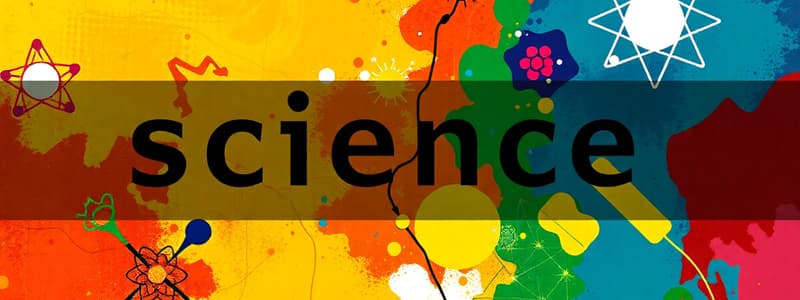Podcast
Questions and Answers
What is the primary focus of natural sciences?
What is the primary focus of natural sciences?
- Study of human behavior and societies.
- Investigation of the universe and natural phenomena. (correct)
- Development of algorithms and computational theories.
- Abstract logic and reasoning.
Which branch of science deals with the study of living organisms?
Which branch of science deals with the study of living organisms?
- Earth Science
- Chemistry
- Physics
- Biology (correct)
What is the correct sequence of steps in the scientific method?
What is the correct sequence of steps in the scientific method?
- Observation, Question, Hypothesis, Communication, Experimentation, Analysis
- Observation, Question, Hypothesis, Experimentation, Analysis, Communication (correct)
- Hypothesis, Experimentation, Observation, Question, Communication, Analysis
- Question, Hypothesis, Experimentation, Observation, Analysis, Communication
Which of the following best describes the focus of formal sciences?
Which of the following best describes the focus of formal sciences?
What is an example of a social science?
What is an example of a social science?
Why is ethical consideration important in scientific research?
Why is ethical consideration important in scientific research?
What aspect of science addresses global challenges like climate change?
What aspect of science addresses global challenges like climate change?
What future direction for science emphasizes the combination of various fields?
What future direction for science emphasizes the combination of various fields?
Flashcards are hidden until you start studying
Study Notes
Definition of Science
- Systematic enterprise that builds and organizes knowledge.
- Involves observation, experimentation, and theoretical explanation of phenomena.
Branches of Science
-
Natural Sciences
- Study of the universe and natural phenomena.
- Subdivisions include:
- Physics: Matter, energy, and their interactions.
- Chemistry: Composition, properties, and reactions of substances.
- Biology: Study of living organisms.
- Earth Science: Earth's structure, properties, processes, and components.
-
Formal Sciences
- Study of abstract concepts and logical reasoning.
- Includes disciplines like:
- Mathematics: Abstract structure, patterns, and quantity.
- Logic: Principles of valid reasoning and argumentation.
- Computer Science: Study of algorithms, computation, and information systems.
-
Social Sciences
- Study of societies and human behavior.
- Examples include:
- Psychology: Study of mind and behavior.
- Sociology: Study of social behavior and structures.
- Economics: Analysis of production, distribution, and consumption of goods.
Scientific Method
- A systematic approach to inquiry.
- Observation: Gather information about phenomena.
- Question: Identify and formulate questions based on observations.
- Hypothesis: Propose explanations for the observed phenomena.
- Experimentation: Test the hypothesis through controlled experiments.
- Analysis: Analyze data and draw conclusions.
- Communication: Share results for peer review and further study.
Importance of Science
- Advances technology and medicine.
- Addresses global challenges (e.g., climate change, health crises).
- Enhances understanding of the universe and human existence.
Ethical Considerations
- Responsibility of scientists to conduct research ethically.
- Issues include:
- Honesty and integrity in reporting results.
- Consideration of human and environmental impact.
Future Directions
- Interdisciplinary research combining various fields.
- Emphasis on sustainable practices and solutions.
- Exploration of space and advancements in artificial intelligence.
Definition of Science
- Science is a systematic approach to gaining and organizing knowledge about the natural world.
- Observations, experiments, and theoretical explanations are key components of scientific inquiry.
Branches of Science
- Natural sciences study the universe and natural phenomena.
- Physics focuses on matter, energy, and their interactions.
- Chemistry explores the composition, properties, and reactions of substances.
- Biology is the study of living organisms.
- Earth science investigates Earth's structure, properties, processes, and components.
- Formal sciences deal with abstract concepts and logical reasoning.
- Mathematics focuses on abstract structures, patterns, and quantity.
- Logic analyzes principles of valid reasoning and argumentation.
- Computer science studies algorithms, computation, and information systems.
- Social sciences analyze societies and human behavior.
- Psychology investigates the mind and behavior.
- Sociology studies social behavior and structures.
- Economics analyzes the production, distribution, and consumption of goods.
Scientific Method
- The scientific method is a structured approach to inquiry.
- It involves the following steps:
- Observation: Gathering information about phenomena.
- Question: Identifying and formulating questions based on observations.
- Hypothesis: Proposing explanations for the observed phenomena.
- Experimentation: Testing the hypothesis through controlled experiments.
- Analysis: Analyzing data and drawing conclusions.
- Communication: Sharing results for peer review and further study.
Importance of Science
- Science drives advancements in technology and medicine.
- It contributes to addressing global challenges like climate change and health crises.
- Science enhances our understanding of the universe and human existence.
Ethical Considerations
- Scientists have a responsibility to conduct research ethically.
- Key ethical concerns include:
- Honesty and integrity in reporting results.
- Consideration of human and environmental impact.
Future Directions
- Interdisciplinary research is likely to become increasingly prominent.
- Sustainable practices and solutions will be a major focus.
- Space exploration and advancements in artificial intelligence are expected to continue.
Studying That Suits You
Use AI to generate personalized quizzes and flashcards to suit your learning preferences.



